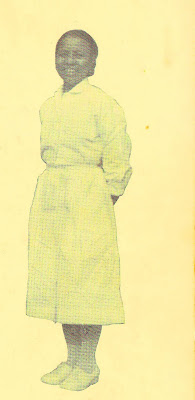
Johnnie Lee Smith, midwife, cook, maid, nurse's aide, and wash-woman (as she has described her duties throughout a long association with the Caldwell Clinic and Memorial Hospital).
She retired in 1977, having assisted several doctors and nurses, LPNs, and other midwives. Her career began in 1938 helping Mrs. Henrietta Shambry, a midwife, and waiting for the day she would retire. She eventually did, and Johnnie Lee took over and delivered a total of 527 babies during the years. Her first delivery was a boy, John Macon, and the last was Bronson Channing Miller on August 9, 1977.
The first clinic that Dr. R.B. and others built was near the Baptist Church on West Main street in 1934 and had 8 beds. It eventually got to 20 beds. According to Johnnie Lee, the first baby born at this hospital was Robert Heflin.
The move across the street to the new hospital in 1950 gave the patients 30 beds and eventually 35. The first baby born there was a Wesson.
Johnnie Lee also wrote that the wash-woman duty was that she would wash and clean the surgical packs after each use and get them ready for the next use. They only had 3 packs at first. The work was hard and tedious, but if she had made a patient comfortable for just a little while, she didn't mind the work.
Thanks for your devotion to duty and your passion for helping folks, Mrs. Smith.
___________________________________
I was born at home in 1939 and had Dr. R. B. and Vina Bradley there at my arrival. They ran my daddy off and he went back to work getting the newspaper out that day in May. I have been told that it got so cold the next day they sent for a ton of coal and got the fireplaces going again.

